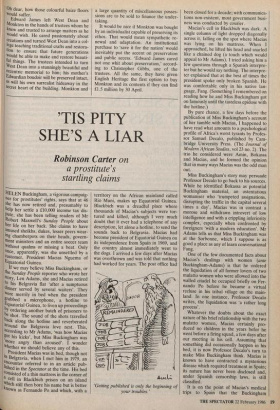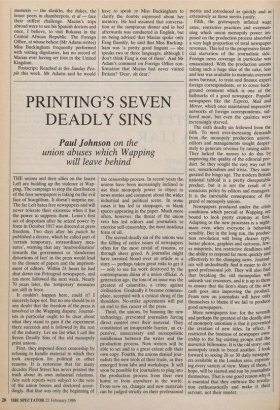'TIS PITY SHE'S A LIAR
Robinson Carter on
a prostitute's startling claims
HELEN Buckingham, a vigorous campaig- ner for prostitutes' rights, says that at 46 she has now retired and, presumably to help her settle a £10,000 income tax dis- pute, she has been telling readers of Mr Robert Maxwell's Sunday People about her life on her back. She claims to have amused sheikhs, dukes, lesser peers wear- ing chamberpots on their heads, govern- ment ministers and an entire soccer team Without qualms or missing a beat. Only mice, apparently, was she unsettled by a customer, President Macias Nguema of Equatorial Guinea.
If we may believe Miss Buckingham, or the Sunday People reporter who wrote her story, Len Adams, she and Macias retired to his Belgravia flat 'after a sumptuous dinner served by several waiters'. They Were merrily in bed when the president grabbed a microphone, a hotline to Equatorial Guinea, to liven up proceedings be ordering another batch of prisoners to De shot. The sound of the shots travelled back along the hotline and reverberated around the Belgravia love nest. This, according to Mr Adams, 'was how Macias got his kicks', but Miss Buckingham was More angry than aroused'. I wonder Whether we should believe any of this. President Macias was in bed, though not in Belgravia, when I met him in 1979, an encounter referred to in an article pub- lished in the Spectator at the time. His bed consisted of a thin mattress in the corner of a cell in Blackbich prison on an island ,Which still then bore his name but is better 'mown as Fernando Po and which, with a territory on the African mainland called Rio Muni, makes up Equatorial Guinea. Blackbich was a dreadful place where thousands of Macias's subjects were tor- tured and killed, although I very much doubt that it ever had a telephone of any description, let alone a hotline, to send the sounds back to Belgravia. Macias had become president of Equatorial Guinea on its independence from Spain in 1969, and the country almost immediately went to the dogs. I arrived a few days after Macias was overthrown and was told that nothing had worked for years. The post office had 'Getting published is only the beginning of your troubles.' been closed for a decade; with communica- tions non-existent, most government busi- ness was conducted by courier.
Macias's cell in Blackbich was dark. A single column of light dropped diagonally across it, falling on the spot where Macias was lying on his mattress. When I approached, he lifted his head and snarled like a chained dog (a touch which would appeal to Mr Adams). I tried asking him a few questions through a Spanish interpre- ter but he would say nothing. The interpre- ter explained that at the best of times the president spoke only broken Spanish. He was comfortable only in his native lan- guage, Fang. (Something I remembered on reading how he and Miss Buckingham got on famously until the tasteless epidose with the hotline.) By pure chance, a few days before the publication of Miss Buckingham's account of her tumble with Macias, I happened to have read what amounts to a psychological profile of Africa's worst tyrants by Profes- sor Samuel Decalo, published by Cam- bridge University Press. (The Journal of Modern African Studies, vol 23 no. 2). The trio he considered were Amin, Bokassa and Macias, and he formed the opinion that in many ways Macias was the odd man out.
Miss Buckingham's story may persuade Professor Decalo to go back to his sources. While he identified Bokassa as potential Buckingham material, an ostentatious womaniser who 'trumpeted assignations, disrupting the traffic in the capital several times a day', Macias was in contrast a morose and withdrawn introvert of low intelligence and with a crippling inferiority complex, especially when confronted by foreigners 'with a modern education'. Mr Adams tells us that Miss Buckingham was at the Sorbonne, which I suppose is as good a place as any of learn conversational Fang.
One of the few documented facts about Macias's dealings with women (ante Buckingham-Adams) is that he ordered the liquidation of all former lovers of two mulatto women who were allowed into the walled citadel he occupied briefly on Fer- nando Po before he became a virtual recluse in his tribal village on the main- land. In one instance, Professor Decalo writes, the liquidation was 'a rather long process'.
Whatever the doubts about the exact nature of his brief relationship with the two mulatto women, Macias certainly pro- duced no children in the years befor he went before a firing squad, a few days after our meeting in his cell. Assuming that something did occasionally happen in his bed, it is now Professor Decalo's turn to make Miss Buckingham think. Macias is known to have contracted a mysterious disease which required treatment in Spain; its nature has never been disclosed and, under Spanish censorship laws, is still classified.
It is on the point of Macias's medical trips to Spain that the Buckingham memoirs — the sheikhs, the dukes, the lesser peers in chamberpots, et al — face their stiffest challenge. Macias's trips abroad were to see his Spanish doctors and once, I believe, to visit Bokassa in the Central African Republic. The Foreign Office, at whose behest (Mr Adams writes) Miss Buckingham frequently performed with visiting dignitaries, has no record of Macias ever having set foot in the United Kingdom.
Postscript: Reached at the Sunday Peo- ple this week, Mr Adams said he would have to speak to Miss Buckingham to clarify the doubts expressed about her memory. He had assumed that conversa- tion at the sumptuous dinner and in bed afterwards was conducted in English, but on being advised that Macias spoke only Fang fluently, he said that Miss Bucking- ham was 'a pretty good linguist — she speaks two or three languages, although I don't think Fang is one of them'. And Mr Adam's comment on Foreign Office con- firmation that Macias had never visited Britain? 'Dear, oh dear.'















































 Previous page
Previous page